Interview conducted and edited by Alyssa Jocson Porter.
The API Flying Bookshelf is a collection “celebrating and promoting the works of Asian & Pacific Islander writers, artists, & scholars,” and includes novels, scholarly work, and even zines. The collection began traveling on July 1, 2014 among various Seattle neighborhoods and finding temporary homes in cafes. In April 2015, I had the chance to meet with API Flying Bookshelf co-founders Sabrina Chen and Derek Dizon and curator Chris Woon. We met at the Bookshelf’s current location, Cafe Hope, a coffee stand inside Asian Counseling and Referral Service with a training program to help clients gain barista and workplace skills. When I arrived, Sabrina, Derek, and Chris were already there with books piled on their table. We talked about the collection and the importance of storytelling and community.
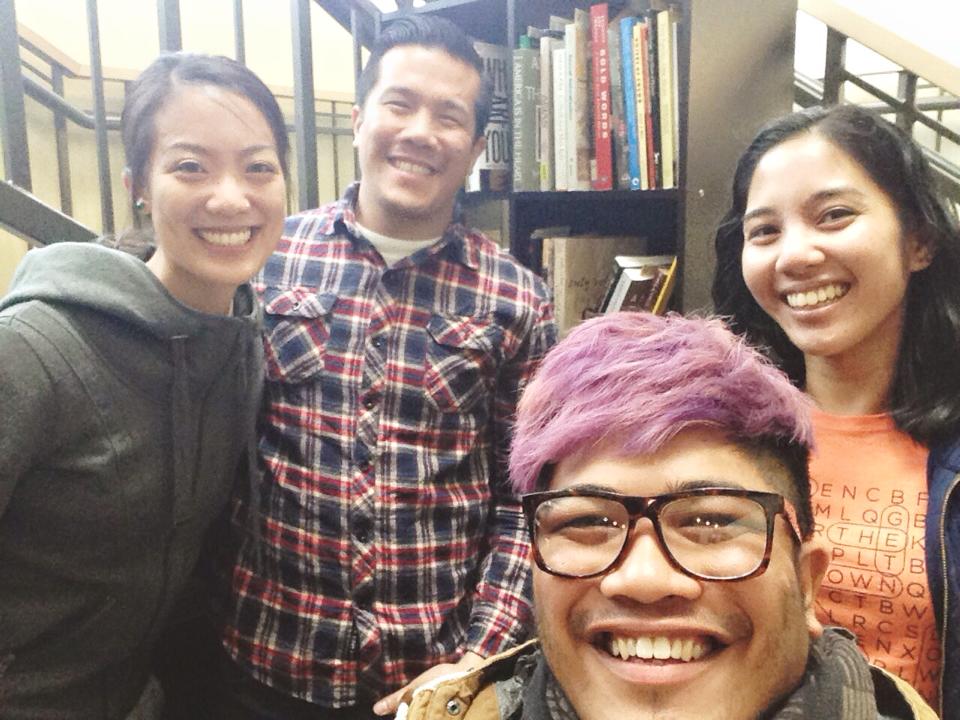
Please introduce yourselves.
Derek Dizon (DD): I’m Derek Orbiso Dizon, and I’m a co-founder and curator.
Sabrina Chen (SC): I’m Sabrina Chen, and I’m a co-founder and curator as well.
Chris Woon (CW): My name is Chris Woon. I am a staff member of the Flying Bookshelf and a curator as well.
DD: I didn’t know we had “staff”! That’s cool. [Laughs]
CW: What else would I be?
SC: I like to call us the API Bookshelf Family.
DD: We also have a graphic designer, Angelo Salgado, and another curator named Tuyen Than.
SC: And Minh Nguyen, aka The Zine Lord, who does all our zines.
Could you briefly describe the API Flying Bookshelf?
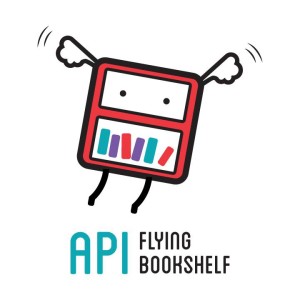 DD: The API Flying Bookshelf is a traveling library which seeks to promote the works of Asian American and Pacific Islander and South Asian artists and storytellers.
DD: The API Flying Bookshelf is a traveling library which seeks to promote the works of Asian American and Pacific Islander and South Asian artists and storytellers.
SC: I’d add that it’s a free library where people can borrow books and read them, and it’s on the honor system.
DD: And it’s centered in community. We usually go to cafes or organizations that are API-centered or API-owned.
What was the inspiration for this project? How did it start?
SC: There’s a bookstore called the Asian American Curriculum Project in San Mateo, CA. It’s been around for a really long time… started [by] a group of Japanese American teachers after World War II. They were seeing a lot of the history curriculum totally left out the Japanese internment, and they wanted to bring together resources that hold that story. They were just collecting stuff. From there it grew into a bookstore. They actually publish books also. They do a lot. They’re really great. So, when I was visiting, [Chris] brought me to that bookstore and also to Eastwind Books of Berkeley. After seeing that, I thought there’s nothing like that in Seattle, but I felt like being in that space is something so powerful. All those Asian American books in one space. Derek and I are really good friends, so after I came back from my trip, I said, “We should open a bookstore.” He’s like, “We can’t do that.” [Laughs]
DD: I suggested a traveling bookshelf or library. Just to start. We had the conversation at a cafe too, so I just envisioned a bookshelf being there.
SC: It was a cafe that we went to a lot in the International District. It had a lot of community folks.
DD: It’s the Eastern Cafe, located in the historic Eastern Hotel. That was the first stop, the first landing. [The launch] was kind of overwhelming.
SC: Yeah, I think people were excited about the concept. It started off as a very small collection and kind of just grew from there. And then the donations started coming. Articles started coming. Derek planned the kick-off event.
DD: It was really great. Maybe 50 people came in and out. Maybe more. We opened up space to have people share stories, someone even did a dance piece in this small cafe. We had poetry, spoken word, rap pieces, and just talked about what it means to tell our stories as people who have not always had opportunities to speak and be heard.
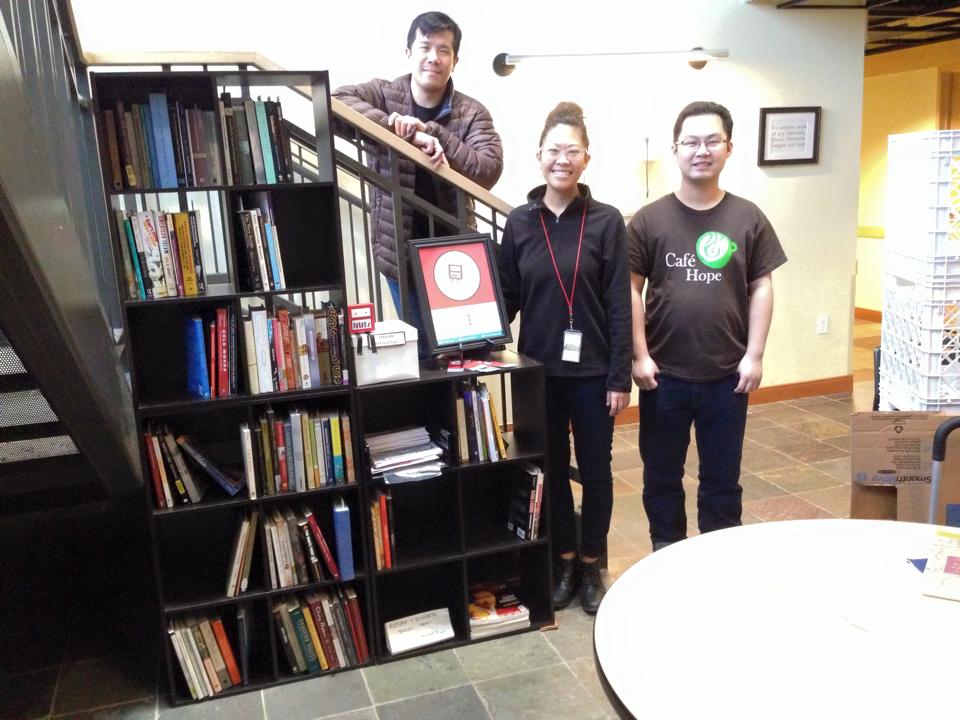
The moving nature of the Bookshelf is very unique. It looks like you already have a lot of books, too. Do you have any plans on expanding?
SC: It’s tough with not very many people [on our team]. Moving one bookshelf is already a lot of work. We would have to start making like three trips or something [if we expanded]. Everything barely fits in Chris’ car right now. I think we’re pretty flexible about our capacity, though, and so we kind of just go with however much time we have to organize everything right now
CW: We have talked about having a home base. It’s our apartment right now.
What system do you have for lending out books?
SC: We use the honor system. We have a stack of cards for people to write their name and contact info.
CW: If people really want [to keep] that book for some reason—if it means that we get it out in the community and it’s getting some good use, then they can keep it. Especially because everything is donated. It’s a tough balance, though. Like some of the books are a little more rare. I just happened to have a few copies of [one title], but we’ve already lost two copies already.
SC: In one of the books we got, there was a paper in the back of it for people to write notes. There was [another] book with a kids’ picture left inside. It’s another cool part of it when curating books—these books hold stories, but they also hold the stories of the people who read them. It’s one of my favorite things about donations. We try to keep track of [those notes] just to show what a physical book really means… There’s something powerful about the people before you who engaged with the book.
CW: And sometimes it helps communicate us with each other, like the used books in college where there are multiple generations of marginalia.
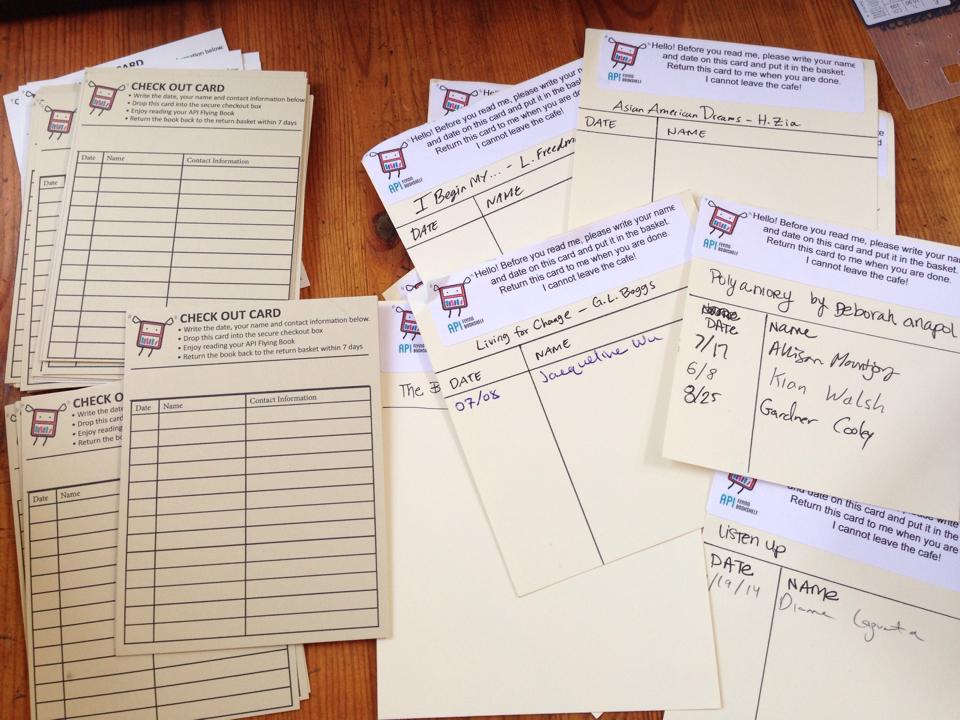
How are books collected/selected?
SC: We started with our own books, and now we have donations. There’s a sign on the Bookshelf that says “Put donations here,” and we try to say, “We may or may not take it.”
DD: And we do want to center on Asian American experiences with a critical, intersectional, type of social justice lens.
SC: We do try to get books too that are narratives that are missing. [If] we know we don’t have much [on a specific topic], we’ll see if we can find that.
CW: With trying to parse the literature, novels are kind of hard sometimes because so many of the narratives are transnational. And that is very much of the Asian American experience too.
SC: We do have, for example, “Asia’s Unknown Uprising.” That’s more focusing on a global perspective of uprisings that are hardly talked about in history books in different countries of Asia. For that, we kept it in because it’s something that gets left out a lot in movements—the background histories of why we’re here.
CW: We do look through the books [gestures to the stacks on the table]… It would be a little iffy if we shot them down [automatically]. For example, this book, “The Mao Case.” The back says “Chief inspector Chen of the Shanghai police department is assigned to a politically sensitive case by the Prime Minister of Public Safety…”, and it’s by a Chinese author who was raised in Shanghai but now lives in St. Louis, Missouri. Is that still part of the Asian American experience? He lives an Asian American experience—who am I to deny that? So, we take it case by case.
What makes the collection significant? What role or mission does the collection address?
CW: I had access to two bookstores in the Bay Area. It was something I took for granted. I also was an Asian American Studies (AAS) major, and I have my master’s in it, so I had this Asian American book collection already from my school days. And then Sabrina—
SC: You were probably thinking, “Why is she getting so excited [about API bookstores]?”
CW: I wouldn’t have known about [the Asian American Curriculum Project], if I didn’t have a family connection to the owner… But for years I didn’t know it was there. It probably wasn’t until I was actually in Asian American Studies that one of my parents told me about it. I think I really took it for granted, and then I moved [to Seattle], and I was like, “Whoa, there’s a void.”
SC: I feel like there is something really powerful about books and having access to some of these stories that people may not have access to. I don’t remember who but somebody was talking about how when they go to a bookstore and they go to the Asian section they see only history books or they go to the Feminism section and there’s not an Asian American feminist perspective. There’s not enough exposure unless you’re in Asian American Studies.
CW: Yeah, you’d go to the Asian section, and it’d be just Asian history books.
DD: Asians from Asia, not Asians from the U.S.
SC: But I think there are really some unique Asian American, Pacific Islander, Southeast Asian American, narratives that are really rich and diverse and interesting.
DD: I was also an AAS major for my undergraduate degree. But even prior going into AAS, as a child, I was always put into that slower reading group as an elementary school kid. I thought I was slow in reading and I thought I was bad at reading, but it was only that I was uninterested in reading other people’s stories I couldn’t relate to. So what does it mean for us as people of color, as Asian Americans? To see ourselves in stories and to speak stories to people who we see ourselves in? I never had an opportunity to experience that as a child. It’s really interesting how we label students, like, “Oh, this person’s slow, this person doesn’t really understand this literature,” but maybe it’s less about understanding literature and more about not seeing ourselves in literature. I think that’s what so amazing about the Bookshelf, that it’s a way for us to see ourselves in stories… And if only one person from the whole community reads one book and they are able to connect with that book and see themselves through that story as a way to connect to the broader community, then I think we’ve served our purpose as a Bookshelf.
CW: To piggyback off that… I used to think I hated literature. In high school, I hated English class. I thought I didn’t like literature. And then finally in grad school, I took Asian American literature courses, and I loved taking literature courses! I loved writing papers about literature. Then all of a sudden I was getting A’s in my classes. It speaks to how these kind of books and stories can resonate in a different way.
DD: That’s really powerful about this Bookshelf: having access and representation. It’s cool too that we have an eclectic collection of different stories. You have those stereotypes about Asians and Asian Americans, that they are A, B, C, but when we read these books, we see the other letters of the alphabet too. I grew up in a primarily white neighborhood… I was never exposed to my people’s stories in textbooks or even in my own family. For the longest time, I internalized that as my family didn’t have stories, our people didn’t have stories… That’s such a lie that we’re being told in so many ways in representations through media, through other libraries, through the education systems. It wasn’t until my AAS program, that I knew about these stories. I just never asked about them. This Bookshelf pushes me and others to ask family members about our stories even though they are hard to tell.
SC: I also keep thinking about our vision of the future [for the Bookshelf]. We could showcase all forms of art by Asian American artists. That’s a form of storytelling too. I think that’s part of the mission of the Bookshelf.
What hopes do you have for the API Flying Bookshelf?
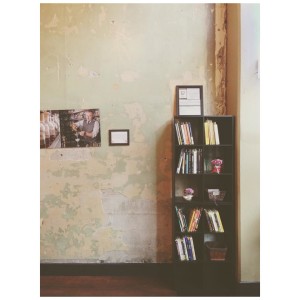
DD: Talk about The Dream!
SC: There might be multiple versions of The Dream. In Brooklyn, we found a reading room. I really like that model where they just have a lot of books and you can go there and check out books like a library but not a part of the [public] library system. You go there and hang out. I think getting to be in one place [instead of traveling around] is the dream… We would love a cafe-type of space.
DD: To have a dedicated space for more than just this Bookshelf would be really amazing.
CW: It depends on how things transform in the future, right? Because we’ve been avoiding creating like a non-profit. We like this collective, contribute-if-you-can approach.
DD: I think if we had a physical spot we’d still have a traveling bookshelf.
SC: We really like that aspect of it because then the Bookshelf appears in different neighborhoods. We started in the International District, then Capitol Hill, and now we’re a little bit more south. I like how the Bookshelf can move to where people are at.
This summer, the API Flying Bookshelf celebrated its one-year anniversary by partnering with another organization supporting the API community, FIGHT (Formerly Incarcerated Groups Healing Together), to raise funds for a new library at Clallam Bay Corrections Center. Their event raised over $100 plus several book donations.
The Bookshelf is currently at Cafe Hope, located on the bottom floor of ACRS, 3639 Martin Luther King Jr. Way S, Seattle, WA 98144. Open hours are Mondays to Thursdays from 9 a.m. – 2:30 p.m, and Fridays from 12:30 – 2:30 p.m.
For more information about the API Flying Bookshelf, visit the official website http://apiflyingbookshelf.com/ or Facebook page https://www.facebook.com/APIflyingbookshelf.
Editing assistance provided by Jaena Rae Cabrera. All photos courtesy of API Flying Bookshelf.

